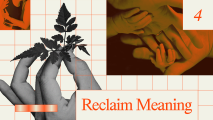Honestly, the whole concept — remote therapy — seemed less sci-fi future than stopgap; not ineffectual, but maybe less useful?
However, wresting control of my borderline personality disorder took years, thousands of dollars, and an altering of my very brain chemistry; the idea of taking a step back towards cruelty and emotional instability was simply unacceptable, SARS-CoV-2 be damned.
So I propped my laptop upon a pair of pillows, plugged in headphones and turned on daytime TV to ensure my roommates could not hear, flipped open the Apple’s eye, and was face-to-face with my therapist.
And it felt like she was there. Or at least there enough.
Remote Therapy And Depression
My anecdotal experience may be belayed by research — at least when it comes to treating depression. A systemic review of 17 randomized controlled trials by McMaster University found that remote cognitive behavioral therapy (CBT) is as effective as in-person for the treatment of depression.
“Although this study started before the current COVID-19 pandemic, it is timely and assuring that treatment delivered electronically works as well if not better than face to face and there is no compromise on the quality of care that patients are receiving during this stressful time,” Zena Samaan, an associate professor at McMaster and a corresponding author on the study, told New Atlas.
This news does come at an opportune time: back in April, a Kaiser Family Foundation survey found that nearly half of U.S. adults polled say the pandemic has had a negative impact on their mental health. And thanks to the need for social distancing, remote therapy options are now more popular than ever.
A Pleasant Surprise
The review, published in the Lancet’s EClinicalMedicine, found that not only is video conferencing similarly effective to seeing your therapist, but so are email, phone calls, and even CD-ROM interventions.Researchers reviewed two decades worth of randomized controlled trials — considered the gold standard for scientific research, RCTs compare interventions to a placebo or control group, with subjects randomly assigned — comparing the efficacy of remote therapy to in-person for patients with major depressive disorder.
Researchers found that the remote therapy methods may even be more effective than in-person.
In something of a surprise, the researchers found that the remote therapy methods may even be more effective than in-person, although the “moderate evidence” is not definitive, leading them to the less dramatic conclusion that the remote therapy was at least as effective.
“The common understanding was that face to face psychotherapy has the advantage of the connection with the therapist and this connection is in part what makes the difference in treatment,” Zena Samaan, an associate professor at McMaster and a corresponding author on the study, told New Atlas.
The review’s results may be driven by access, the researchers theorize; the convenience of remote therapy may outweigh whatever benefits are gained from the intimacy of in-person CBT.
“Electronic options should be considered to be implemented for delivering therapy to patients,” Samaan said. “This can potentially vastly improve access for patients, especially those in rural or underserved areas, and during pandemics.”
We’d love to hear from you! If you have a comment about this article or if you have a tip for a future Freethink story, please email us at [email protected].






